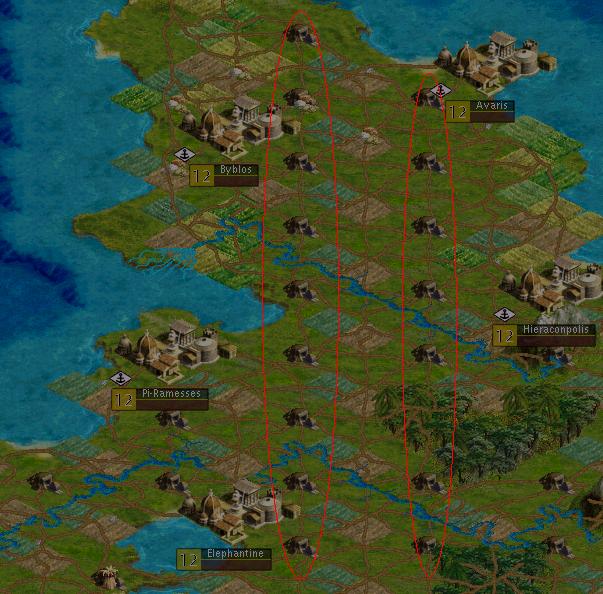warpstorm
Yumbo? Yumbo!
If you have to deal with corruption, you may as well just send units and disband them.
Yeah...that's really the equivilant of everything that's been said up to now....sigh.If you have to deal with corruption, you may as well just send units and disband them.
 Why do I even bother?
Why do I even bother?
...I feel like a bloody salesman!
Micromanagement would be quite low
which seems like a minor problem that could be easily overcome
Shipping food makes sence.
AI should be able to handle this because it's really just aquestion of supply and demand
Civ3 has the lowest amount of micromanagment (in proportion to its scope) that I have ever seen in a game --if it got any simpler, toddlers could play it. As I said before, Diverting shields/food would almost as simple as telling a unit to go to a specific city (and it wouldn't clutter up the F1 screen). Tedious is having to deal with every stupid, insignificant problems that the City Governor doesn't know how to deal with. Tedious is having to waste hours waiting for the game's turns to go by. This would only require a bit more thought to be put into city management, but I don't see why it would be tedious.There already is too much micromanagement in the game, IMO. Depends how tedious you want to be.
It's a logical assumption, and I don't see why something as trivial as that should be reason enough to trash this idea.How do you know?
Reality is not my primary reason for proposing this. Being able to transfer stuff between cities makes sense because if they form part of the same civ then they need to be able to cooperate. It makes sense because if you can produce use terrain output in one city, why not another at a cost (shipping)?There are plenty of things that would make sense because of what happens in reality, but it shakes the very foundation/principle of the game. Game play and strategy is more important than realism.
Getting the AI to divert stuff just means it has to take output of that city vs the output of all other cities into account. It compares what it needs with what it's got and then with what it wants (e.g. more units, better economy, growth, ect.) with what it can afford. It means that it has to know math (i.e. it needs a calculator). If it didn't already have one, the AI civs would be a mess because it wouldn't know how to balance taxes/science/luxuries. Whether it knows how to balance maintenance costs or just builds stuff until it disbands/sells off is another question I don't have the answer to --the fact that the AI rarely ever has any gold could be an indication that it doesn't take maintenance into account. If that's the case then what can I say except that designers should have put more into the AI instead of messing around with the glitchy Multiplayer so much.The AI won't be that smart for many years, so don't blame the programmers, blame it on the current state of technology.
Tedious is having to deal with every stupid, insignificant problems that the City Governor doesn't know how to deal with. Tedious is having to waste hours waiting for the game's turns to go by. This would only require a bit more thought to be put into city management, but I don't see why it would be tedious.
In general, I can easily get 25% more production out of a city than the AI can.

It's a logical assumption, and I don't see why something as trivial as that should be reason enough to trash this idea.
with what it can afford.
instead of messing around with the glitchy Multiplayer so much.
 !!
!!
 !!!
!!!
 ! Rather than have to disband these units for shields, it would probably be better if you got the shields as a reward as soon as it entered your city! That way you can just do either goto, or set a rally point for these units, and then forget about them (at least until such time as you want to send them elsewhere).
! Rather than have to disband these units for shields, it would probably be better if you got the shields as a reward as soon as it entered your city! That way you can just do either goto, or set a rally point for these units, and then forget about them (at least until such time as you want to send them elsewhere).
 !
!but on the surface it has several advantages
About Bamspeedy's comment concerning the bigger civs having an advantage:
Although this is always a problem when coming up with empire-wide game enhancements, the effects of corruption do decrease the advantage significantely --small civs have less production but they also have less corruption so in proportion, they have more production than bigger civs.

what about Democracies which have no corruption?
the 'Murmansk effect' is no longer possible
Otherwise, the idea of more cities = more of everything for everyone (minus corruption) is a great concept because it creates the effect of truely interconnected societies.
The only problem with this is of course that it gives the human an advantage over the AI as programmers would probably have trouble getting the AI to use this feature. Then again, the Civ2 AI had this problem and nobody complained.
there should be a possibility of buying shields/food and sending them to another city's shield/food box
